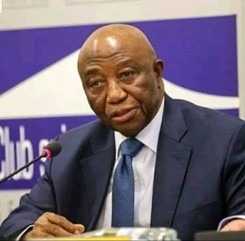Paragraph 1: A Toast to Freedom and Partnership
On April 10, 2025, Liberian President Joseph N. Boakai hosted his inaugural annual media dinner, an event designed to symbolize the burgeoning partnership between his administration and the press. Held at the Ministerial Complex, the dinner served as a platform for President Boakai to reaffirm his commitment to free speech and a thriving media landscape. He characterized the event as more than a mere formality, highlighting it as a gesture of appreciation for the pivotal role the media plays in a healthy democracy. The President lauded the Liberian media’s resilience, vigilance, and unwavering dedication to truth-telling, emphasizing the shared responsibility between the government and the press in advancing the nation’s progress.
Paragraph 2: Championing Liberty and Press Freedom
President Boakai underscored Liberia’s historical role as a bastion of liberty and freedom, not only within Africa but globally. He stressed that press freedom is not an inherent right but one that requires constant defense, expansion, and institutionalization. Proudly proclaiming Liberia as a continental leader in championing press freedom, Boakai reiterated his government’s unwavering commitment to the Table Mountain Declaration. He emphasized that this commitment wasn’t merely symbolic but a tangible pledge to protect journalists’ rights and ensure the free flow of information within Liberian society.
Paragraph 3: Transparency and Access to Information
The President highlighted his administration’s strides in promoting transparency and accessibility of information, citing the establishment of the Commission on Information. This body, supported by partners and stakeholders, is tasked with improving public access to government data and fostering a stronger connection between citizens and the state. Boakai further emphasized ongoing efforts to strengthen the enforcement of the Freedom of Information Act, asserting that information held by public institutions should be readily available rather than concealed. He reinforced the principle that access to information is not a privilege but a fundamental right, a right his administration is dedicated to upholding.
Paragraph 4: Protecting Journalists and Embracing Criticism
President Boakai pledged to uphold the Abdullah K. Abdullah Act, a piece of legislation designed to safeguard press freedom and honor the legacy of a prominent Liberian media figure. This Act provides protection for journalists against arbitrary arrest and intimidation, enshrining media freedom as a cornerstone of Liberian democracy. Boakai unequivocally declared that under his leadership, Liberia would be free from political prisoners and press suppression. He embraced criticism as an essential component of democracy, promising to engage with dissenting voices rather than silencing them. The President underscored his administration’s commitment to listening and responding to inquiries from the press.
Paragraph 5: Acknowledging Growth and Addressing Challenges
President Boakai celebrated a marked increase in the number of registered media outlets since his assumption of office, attributing this growth to a political climate that respects the freedom of speech, publication, and critical analysis. He admitted, however, that challenges remain, including the need to enhance professionalism within the media, combat the spread of misinformation, and guarantee the safety and well-being of journalists throughout the country. Despite these challenges, the President urged attendees to recognize the progress made and to continue working collaboratively toward a society where facts, respect for traditional values, and a thriving media landscape are paramount. He envisioned a future where government and the press, while maintaining their distinct roles, collaborate for the betterment of the Liberian people.
Paragraph 6: The Unresolved Issue of Media Debt
A significant omission from President Boakai’s address was the issue of outstanding media debts, both inherited and accrued under his administration. The government had previously referred these debts to the General Auditing Commission for review as part of a broader assessment of domestic debt dating back to 1980. Despite repeated appeals from media organizations and Senator Darius Dillon, Chair of the Senate Committee on Communications and Broadcasting, urging the government to acknowledge and address these debts, President Boakai remained silent on the matter. This silence casts a shadow over the proclaimed media partnership, leaving the question of its effectiveness in a financially strained media environment unanswered. The future remains uncertain as to whether the President’s words will translate into concrete action to support a struggling media sector.


